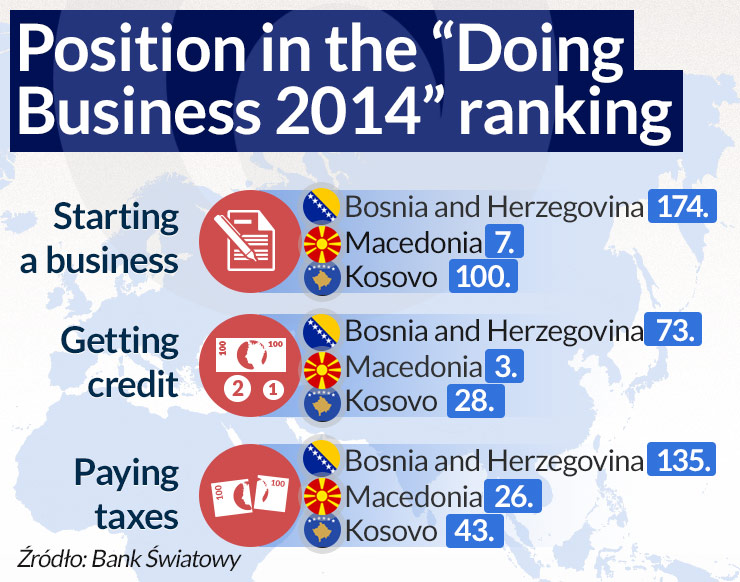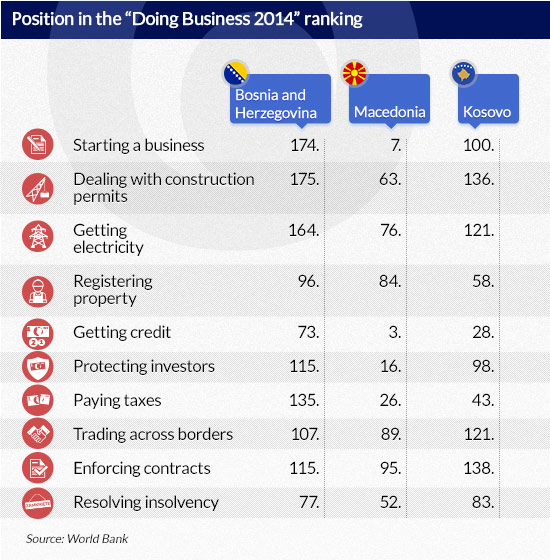
(infographic: D. Gąszczyk)
If I wanted to start the analysis of events in Bosnia and Herzegovina by quoting a curiosity, I should write that it is the country of the most developed administration on the continent. In the entire state, there are almost 150 acting ministers and 40 percent of the annual GDP is spent on maintenance of this bureaucratic machine. It is all happening in the name of equality and respecting the rights of various nationality groups inhabiting Bosnia. The nationalities are the key to understanding the origin of problems in this country – it is no accident that the term: the ‚Balkan pot’ has permanently entered the language.
Bosnia and Hercegovina is inhabited by three nations: the Croats, the Serbs and the Bosniaks, with the latter constituting the largest group. When Yugoslavia still existed, these nations used to live in relative harmony; however, following its disintegration, they started to fight against each other (the war in the years 1992-1995). Pursuant to the Dayton Agreement (1995), which was to end the acts of war, the country was divided into two autonomous parts: the Federation of Bosnia and Herzegovina (with its capital in Sarajevo) and the Serbian Republic (with its capital in Banja Luka), moreover, the Brčko district acting under international supervision, was separated in the north.
Bureaucracy for a legitimate goal
Bearing in mind the tragic experience of fighting among individual nationality groups, the authors of the Dayton Agreement ensured equal participation of all three of the most sizeable groups in the executive authorities (at the same time, the national minorities were totally ignored, which is discussed below). Irrespective of the central government in Sarajevo, comprising an equal number of representatives of the Serbs, the Croats and the Bosniaks, each of the autonomous regions has its own government and president. The country is headed by the Praesidium, with its governing members rotating every eight months.
The aim is to ensure that each of the largest ethnic groups has its representative in every public institution – everything for the sake of justice and peace. However, as a result of such an approach, Bosnia and Herzegovina has one of the most developed bureaucratic apparatuses in the world, and the multitude of ineffective and corrupted authorities leads to administrative paralysis. Let us remember that we are talking about a country whose size corresponds to the area of two Polish provinces, which is inhabited by only 4 million people (some sources report that it is currently only 3 million).
Public discontent has been observed for a long time and the outbreak of protests was only a matter of time. Some political writers even wonder how it is possible that the protests have only recently spread across the country. A quick look at the figures is sufficient: according to various sources, unemployment has hit the level of 27.5 – 44 per cent (reaching even 60 per cent among young people), GDP: USD 17.4 billion, GDP growth rate: 0.4 per cent, 20 per cent of inhabitants live below the poverty line… Anyone able to develop a reasonable scenario to rescue the country from economic collapse would deserve a Nobel Prize (I only wonder whether it should be a prize in economic sciences or a peace prize, since the tense situation may at a certain point lead to an escalation of conflict between individual groups).
The oversized administration is not only ineffective but also riddled with corruption. The data lead one to the conclusion that it is impossible to arrange any matter in government offices of Bosnia without a bribe. Transparency International reported in 2012 that the average level of bribes in the judiciary amounted to about PLN 4450, whereas customs officers expected PLN 2700 on average. At the same time, the average salary in 2013 amounted to EUR 420, i.e. the equivalent of approximately PLN 1800.
Damages following the privatisation
According to the statistics, 80 per cent of the privatised enterprises went bankrupt. The reasons for this bad result include transferring the enterprises to unqualified governors and theft, although the uncertain legal status and the aforementioned corruption are also important contributing factors.
The direct cause of the outbreak of protests which spread all over Bosnia was the closure of a factory in Tuzla in February 2014. Prior to this the plant had been privatised.
Strikes also quickly erupted in other cities, mainly in the Federation of Bosnia and Herzegovina, inhabited by the Bosniaks and the Croats, where the corruption is the most acute. People (and the social profile of the protesters is very broad – students, the unemployed, entrepreneurs, the retired…) demanded mainly the establishment of a technical government which would regularly report on its operations, the creation of a special privatisation procedure, a campaign against economic crime, and an effective campaign to reduce unemployment. These were not peaceful protests – the Polish media focused mainly on the burning of a Presidential administration building, which was presumably a symbol of the riots; however it would be a mistake to identify it as a hooligan, thoughtless act of vandalism.
The protests have led to the resignation of prime ministers in several cantons. People demanded that early elections to central government. This is, however, unlikely since the Croats and Serbs living in the country do not identify themselves with the opinions of the unsatisfied Bosniaks. They think that the difficult situation of the Bosniaks is their internal problem. Milorad Dodik, the President of the Serbian Republic, even said that „the protests in the Bosnian part of the country are targeted at destabilising the federal state”, and he referred to the participants of protests in the Serbian part of the country as „Bosnian provocateurs”.
At the end of the ranking lists
Politics aside, let us look at the economy. Its condition is dramatic and rather it will not change quickly – there is neither commitment nor an idea of how to reform the system. I have recently written about the opportunities of Kosovo to improve the situation and I have emphasised the fact that although the economic indicators are still poor today, the country has been rapidly catching-up, which was recorded, among others in the „Doing Business” ranking. For the time being, Bosnia and Herzegovina will not repeat this success – in all categories it is ranked very low, e.g. in the category of „dealing with construction permits” it almost closes the classification, being placed in 175th position.
A comparison of Bosnia with Kosovo and Macedonia, the poorest states of the region, shows how big its distance is to these two countries. In the „Doing Business 2014” ranking these states are placed as follows:
Foreign investors are afraid of investing their capital in Bosnia. A quick test – when entering the keyword „Bosnia foreign investment” in a search engine, we are redirected to various guides issued by public institutions, encouraging to invest in the country, but we will fail to find any information on companies which decided to take such a step. Even cheap labour will not compensate the losses a western company may incur by conducting business in a country of such unfavourable legislation; therefore, unless this country becomes entrepreneur-friendly, western capital will choose Macedonia or Albania. A country of such a high level of corruption will never be friendly to businessmen, so the circle closes.
In English-speaking media, Bosnia is referred to as stagnant but stable. While the political stability is difficult to predict, the stagnation seems to be an inherent part of the scenario for at least the next five years.
Far from Europe
One of the fundamental goals – underlined since the beginning of the engagement of the international community in Bosnia – is its integration with the European structures, mainly with the European Union. The EU is, by the way, responsible for Bosnia in a particular way, since it has adopted the role of peace guarantor in the country and it has undertaken to coordinate the reforms. In Sarajevo, a special EU representative with very broad administrative powers operates.
However, Sarajevo is still light years apart from Brussels. Although Bosnia signed the Stabilisation and Association Agreement with the European Union as early as in 2008, its entry into force has been frozen. There were several reasons for the suspension, the most important of which was the lack of consensus among the country’s leaders concerning the amendments to the constitution and the removal of its provisions discriminating national minorities. The systemic acts envisage the broadest possible equality of the three leading nationalities, while totally omitting the representatives of other nations.
In 2009 the European Court of Human Rights issued its decision concerning Dervo Sejdić and Jakob Finci, the first one being a Roma and the second one a Jew, both of whom had earlier been rejected the right to run for elections to the Praesidium, referring to the law that states that only Bosniaks, Serbs and Croats may be members of this body. The Court adjudicated that all citizens of the country should have the opportunity to apply for a position in the three-person rotational Praesidium of the Republic. The Bosnian party firmly refused to make amendments to the constitution, whereby it not only has temporarily closed its road towards the European Union institutions but has also provoked the EU to apply painful financial cuts.
At the end of 2013, the European Union reduced the financial aid allocated for preparation of the country for potential membership in the EU by over a half. Another question is that the EU Member States would not agree to accept the accession of such a poor and „problematic” state, and the sole argument of the need to support this country that is tired of instability would not convince anyone that integration at this very moment is a sound idea.




